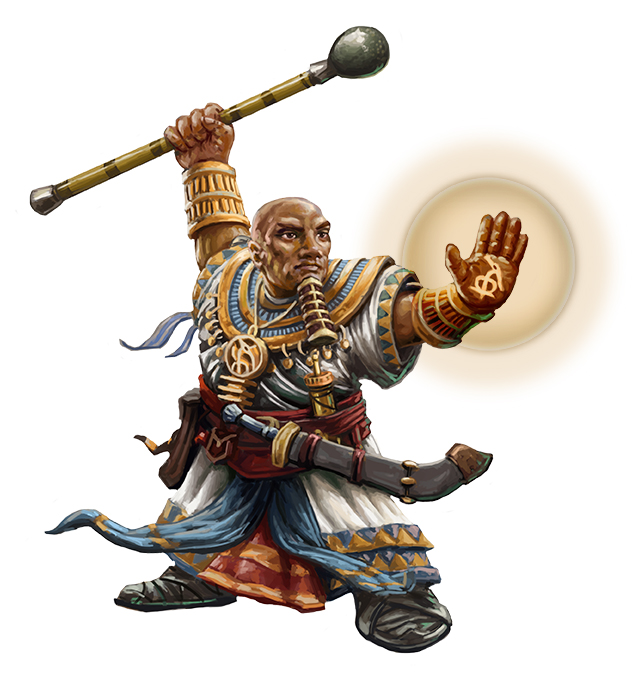
A common trope in pulp fantasy involves a protagonist beholden to a destiny bestowed upon them by the gods. In 5E D&D, one of the coolest cleric abilities is Divine Intervention, where the cleric has a chance to call upon their patron and request aid.
If you play a cleric, you should have a well-defined relationship between your character and their god. Let’s explore this relationship by providing a foundation for cleric characters born with a divine purpose woven into their background.
Revealing Divine Purpose
A new cleric doesn’t necessarily know their divine purpose. They uncover their divine purpose as they adventure and then bring it to reality through their actions. A GM can simulate this using a progression of unlocks as the cleric gains levels. Like a choose-your-own-adventure path, these unlocks depend on character choices, and each unlock offers different story options. Of course, the unlocks offer a few random possibilities as well.
A character doesn’t assume purpose; the deity bestows it. Divine purpose isn’t revealed to the character, but instead becomes something they pursue, something elusive which they connect to by faith. When creating a 1st-level character, they must prove to themselves that they have a purpose. That is the paradox. Are they “The One?”
In their journey to find their divine purpose, the cleric begins with the pursuit of an act of faith—a challenging event or sacrifice that serves as an omen of well-placed faith.
Acts of Faith
Here are some examples of acts of faith based on different domains mentioned in Appendix B of the Basic Rules.
Death. An act of faith for a death domain cleric involves interaction with death, its cause, prevention, near-death experiences, or interacting with the departed.
- Experience death, as a near-death experience or an actual death.
- Cross the threshold into the realm of the dead.
- Speak with the spirits of your predecessors.
- Bring death to specific individuals who appear in your visions.
Life. An act of faith for a life domain cleric occurs when their actions reaffirm life or the value of life and living things. For example, destroying unlife or bringing a peaceful resolution to longtime adversaries.
- Find life where there seems to be none.
- Burn the tomes of a powerful necromancer.
- Survive an entire battle without raising a weapon.
- Perform a series of acts of selfless compassion to a wartorn land.
Light. Clerics of the light domain uncover faith when their holy light conquers evil and illuminates truth in the world. Acts of faith include actions where their divine radiance drives off or defeats darkness.
- Illuminate three locations that haven’t been illuminated in over a century.
- Drive off a force of creatures from the unlit realms with your holy light.
- Walk through a conflagration and emerge miraculously unharmed.
- Restore promise to a community that has lost hope.
Nature. Clerics of nature act as its emissaries, providing its voice when civilization oversteps its boundaries. Acts of faith occur when nature triumphs over situations that threaten its balance, such as the restoration of ecosystems, the reclamation of ruins, and the repopulation of species.
- Help nature reclaim one piece of settled land.
- Assume the form of a totem animal, and spend one month living in your alternate form.
- Purify tainted water in three sacred springs.
- Consecrate a sacred grove deep in the woods.
Knowledge. Clerics of the knowledge domain seek truth and understanding. Acts of faith occur when they are gifted with lost lore, forgotten truths, and the transition of the cryptic into understanding.
- Recover a tome of lost lore.
- Learn the location of a powerful relic or artifact.
- Decipher a phrase written in an unknown language.
- Make three predictions based on observed astronomic changes.
Tempest. The forces of the tempest are powerful and destructive. For a tempest cleric, acts of faith involve surviving a terrible storm’s effects and proving oneself worthy of accepting such power.
- Miraculously survive a near drowning.
- Learn the true names of three powerful elementals.
- Journey to a temple atop a high peak during a violent storm.
- Lead companions or allies safely through a hostile environment such as a burning desert or an icy glacier.
Trickery. To clerics dedicated to the domain of trickery, an act of faith occurs when someone’s fate twists. Any manipulation or misinterpretation of reality that produces significant consequences or inspires wonder in others might be an act of faith.
- Acquire a great treasure using only your words.
- Convince the world that you do not exist.
- Solve a collection of infamous riddles.
- Perform a miraculous escape.
War. War is complex, intimate, and frequently a gateway to passage into the next world. While war clerics find acts of faith during great battles, loss, and bloodshed, they can also occur in times of peace or in honoring those who have fallen in battle.
- Teach a village militia to take up arms.
- Recover a sacred weapon and have a powerful lord accept it as an honored gift.
- Convince several mighty warriors to make offerings to your god before battle.
- Find the lost graves of three paladins and bring them honor.
The Next Step
Upon completing an act of faith, the cleric gains a new understanding of how they fit into the grand scheme. They pick up clues about their relationship with themselves, the world, their tenets, and their deity.
These clues are “key points,” little pieces which add up to more significant “revelations” and ultimately a top tier “epiphany.” As the smallest clues, key points direct the characters to uncover revelations. The next article looks at how characters acquire key points.
Discover more about your character—of any class—by gazing into the Tome of Heroes. Use this book of character options to make your character special, with new backgrounds, subclasses for every class, unusual races, tons of new equipment,and much more!
